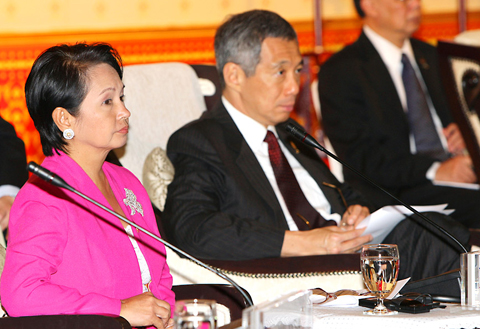Singapore’s leader has warned the global economic slump may last several more years if the US doesn’t fix its creaking banking system, a newspaper reported yesterday.
Singaporean Prime Minister Lee Hsien Loong (李顯龍) also called on US President Barack Obama to resist pressure from the US public for protectionist policies such as trade barriers to protect homegrown industries during the downturn.
Lee, in Thailand for the 14th annual summit of Southeast Asian leaders, told the Bangkok Post in a pre-summit interview that the US — the world’s largest economy — will be in recession for at least the rest of the year and could continue to stumble after that.

PHOTO: BLOOMBERG
“So you could easily be in for several years of quite slow growth worldwide. And I think it’s best that we prepare for that, and prepare our people,” said Lee, son of Lee Kuan Yew (李光耀), the city-state’s leader from 1959 to 1990.
Leaders and top officials from ASEAN — a region of more than 500 million people — are gathered in the Thai resort town of Cha-Am, 200km south of Bangkok, for the grouping’s 14th summit.
The meeting, usually dominated by human rights issues, is overshadowed this year by the global economic meltdown, which has already dragged the export-dependent region’s most advanced economy, Singapore, into recession.
Thailand’s economy shrank in the fourth quarter and others like Malaysia and Indonesia are facing rapidly slowing growth as exports crumble. Singapore warns that its economy will contract as much as 5 percent this year.
The region — which groups one of Asia’s richest countries with some of its poorest — is at the mercy of global economic winds, particularly from the US, a major export market for Southeast Asian countries.
US banks are loaded with hundreds of billions of dollars of toxic assets after the overheated US housing market imploded last year, sending shock waves through the global financial system.
Lee said fixing ailing banks in the US and some major European countries would require politically difficult and costly decisions such as nationalization, massive injections of capital, or governments buying the banks’ bad assets. All involve nationalizing the banks “one way or another,” he said.
“I think the choices are not easy but they have to be made. If you do not make a choice then the outcome will be like what happened in Japan in the 1990s and it went on for more than a decade because the problem just lingered,” Lee said.
On protectionism, Lee said the openness of the US economy had for years driven the increase in global trade and rising prosperity, all of which was at stake if the US turned inward.
“If America turns inward, it is going to do the world a lot of harm and do themselves a lot of harm,” he said.

The US dollar was trading at NT$29.7 at 10am today on the Taipei Foreign Exchange, as the New Taiwan dollar gained NT$1.364 from the previous close last week. The NT dollar continued to rise today, after surging 3.07 percent on Friday. After opening at NT$30.91, the NT dollar gained more than NT$1 in just 15 minutes, briefly passing the NT$30 mark. Before the US Department of the Treasury's semi-annual currency report came out, expectations that the NT dollar would keep rising were already building. The NT dollar on Friday closed at NT$31.064, up by NT$0.953 — a 3.07 percent single-day gain. Today,

‘SHORT TERM’: The local currency would likely remain strong in the near term, driven by anticipated US trade pressure, capital inflows and expectations of a US Fed rate cut The US dollar is expected to fall below NT$30 in the near term, as traders anticipate increased pressure from Washington for Taiwan to allow the New Taiwan dollar to appreciate, Cathay United Bank (國泰世華銀行) chief economist Lin Chi-chao (林啟超) said. Following a sharp drop in the greenback against the NT dollar on Friday, Lin told the Central News Agency that the local currency is likely to remain strong in the short term, driven in part by market psychology surrounding anticipated US policy pressure. On Friday, the US dollar fell NT$0.953, or 3.07 percent, closing at NT$31.064 — its lowest level since Jan.

The New Taiwan dollar and Taiwanese stocks surged on signs that trade tensions between the world’s top two economies might start easing and as US tech earnings boosted the outlook of the nation’s semiconductor exports. The NT dollar strengthened as much as 3.8 percent versus the US dollar to 30.815, the biggest intraday gain since January 2011, closing at NT$31.064. The benchmark TAIEX jumped 2.73 percent to outperform the region’s equity gauges. Outlook for global trade improved after China said it is assessing possible trade talks with the US, providing a boost for the nation’s currency and shares. As the NT dollar

The Financial Supervisory Commission (FSC) yesterday met with some of the nation’s largest insurance companies as a skyrocketing New Taiwan dollar piles pressure on their hundreds of billions of dollars in US bond investments. The commission has asked some life insurance firms, among the biggest Asian holders of US debt, to discuss how the rapidly strengthening NT dollar has impacted their operations, people familiar with the matter said. The meeting took place as the NT dollar jumped as much as 5 percent yesterday, its biggest intraday gain in more than three decades. The local currency surged as exporters rushed to